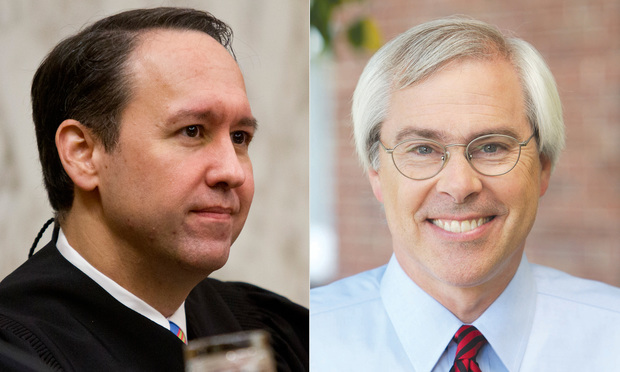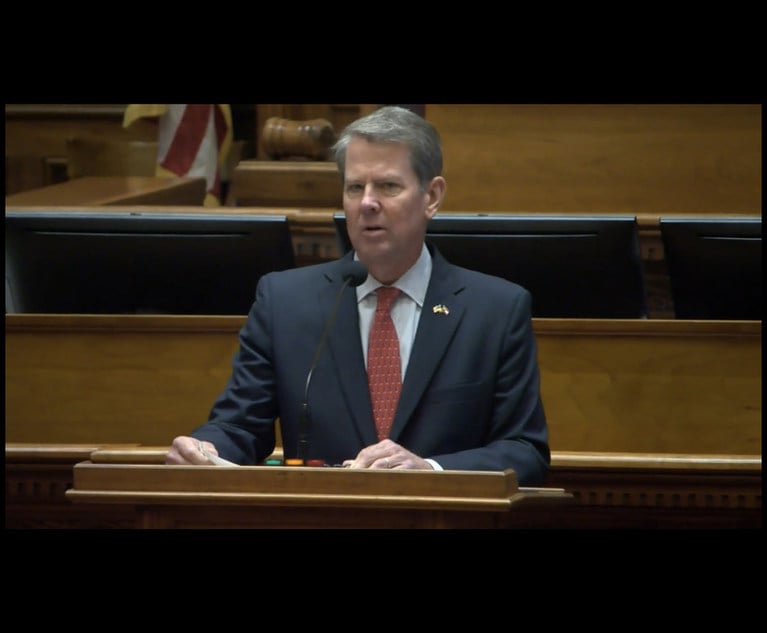Justice Blackwell's Would-Be Opponent Seeks Emergency Order to Reinstate Election
The motion calls on the appeals court to set aside a Fulton County judge's ruling affirming Secretary of State Brad Raffensperger's right to cancel the election.
March 18, 2020 at 03:11 PM
4 minute read
 Justice Keith Blackwell (left) and John Barrow.
Justice Keith Blackwell (left) and John Barrow.
An emergency motion was filed Wednesday asking the Georgia Court of Appeals for a writ of mandamus to reinstate the canceled election for state Supreme Court Justice Keith Blackwell's seat.
The motion calls on the appeals court to set aside Fulton County Superior Court Judge Emily Richardson's Monday ruling affirming Secretary of State Brad Raffensperger's right to cancel the election so Gov. Brian Kemp can nominate Blackwell's replacement.
The underlying mandamus petitions were filed by former U.S. Rep. John Barrow, who is an Athens attorney, and Beth Beskin, a partner at the Atlanta offices of Freeman, Mathis & Gary. Both wish to run for Blackell's seat.
 Trip Tomlinson of Pope McGlamry, Columbus, Georgia (Courtesy photo)
Trip Tomlinson of Pope McGlamry, Columbus, Georgia (Courtesy photo)Barrow counsel Wade "Trip" Tomlinson, one of a team of Pope McGlamry lawyers representing the prospective candidate, said an emergency review is critical because the canceled election was scheduled to take place May 19, and absentee ballots must be available at least 45 days before the election.
Blackwell's term ends Dec. 31. The associate justice resigned Feb. 26, effective Nov. 19. Kemp and the state attorney general have contended that, because Blackwell resigned within six months of the May 19 election, the governor has the authority to choose a replacement.
The emergency petition contends Richardson's March 13 ruling upends the Georgia Supreme Court's 2016 ruling in Clark v. Deal.
In an opinion written by current Chief Justice Harold Melton, the high court held that a vacancy is defined as "an unoccupied office in which there is no incumbent legally qualified" to hold the post and exercise the judicial powers of the office. The case was an unsuccessful challenge of then-Gov. Nathan Deal's appointment of three judges to fill three new seats established by the Georgia General Assembly on the state Court of Appeals.
Richardson had "no power" to overrule Clark v. Deal and "offered no rationale to reconcile the substantial difference between a 'vacancy' where there is an occupied office versus an unoccupied one," Tomlinson argued.
Tomlinson also argued that an accepted resignation does not create an immediate vacancy for the governor to fill.
Tomlinson also challenged the state attorney general's reliance on a 1992 unofficial AG opinion holding that a governor's acceptance of a Supreme Court justice's resignation causes the seat to become vacant as a matter of law.
"Let's be clear here," said Tomlinson co-counsel Lester Tate, a former president of the State Bar of Georgia and a partner at Akin & Tate in Cartersville. "An unofficial AG's opinion is no more than an interoffice memo, and it should not trump the Constitution or the ability of the people to elect a Supreme Court justice."
A spokeswoman for Attorney General Chris Carr, whose staff represents Blackwell and Raffensperger, has repeatedly declined to comment on the matter.
Michael Moore, former U.S. attorney for the Middle District of Georgia and another member of Barrow's Pope McGlamry team, said, "It should come as no surprise that the governor, just as when he was the former secretary of state, is continuing his pattern of voter suppression."
"Back then, he did it by invoking his power to block access for thousands to the ballot box," Moore said. "Now he is blocking the voters from having the chance to vote in a constitutionally required election with a few tricky strokes of his gubernatorial appointment pen. Our client trusts the voters to choose their Supreme Court justices."
Beskin on Wednesday voiced her own concern that if Richardson's ruling is affirmed, "Georgia will no longer have judicial elections, or at least will no longer have elections for Supreme Court justices."
A Fulton County senior superior court judge, in a letter to the Daily Report Wednesday, argued that Kemp's maneuvering to replace Blackwell by appointment rather than election constitutes "a suppression of Georgia voters' rights."
Senior Judge Melvin Westmoreland said that, when he retired in 2010, "I guess I could have then announced my retirement effective the day before the election so as to allow the governor to anoint my successor, regardless of the voters' choice."
"If that type of reasoning prevails, Georgia voters will have lost our constitutional right to vote for judges," Westmoreland said.
This content has been archived. It is available through our partners, LexisNexis® and Bloomberg Law.
To view this content, please continue to their sites.
Not a Lexis Subscriber?
Subscribe Now
Not a Bloomberg Law Subscriber?
Subscribe Now
NOT FOR REPRINT
© 2025 ALM Global, LLC, All Rights Reserved. Request academic re-use from www.copyright.com. All other uses, submit a request to [email protected]. For more information visit Asset & Logo Licensing.
You Might Like
View All
Panel to Decide if Governor Should Suspend Georgia Lawyer From Elected Post
4 minute read

Plaintiffs Attorneys Awarded $113K on $1 Judgment in Noise Ordinance Dispute
4 minute readTrending Stories
Who Got The Work
J. Brugh Lower of Gibbons has entered an appearance for industrial equipment supplier Devco Corporation in a pending trademark infringement lawsuit. The suit, accusing the defendant of selling knock-off Graco products, was filed Dec. 18 in New Jersey District Court by Rivkin Radler on behalf of Graco Inc. and Graco Minnesota. The case, assigned to U.S. District Judge Zahid N. Quraishi, is 3:24-cv-11294, Graco Inc. et al v. Devco Corporation.
Who Got The Work
Rebecca Maller-Stein and Kent A. Yalowitz of Arnold & Porter Kaye Scholer have entered their appearances for Hanaco Venture Capital and its executives, Lior Prosor and David Frankel, in a pending securities lawsuit. The action, filed on Dec. 24 in New York Southern District Court by Zell, Aron & Co. on behalf of Goldeneye Advisors, accuses the defendants of negligently and fraudulently managing the plaintiff's $1 million investment. The case, assigned to U.S. District Judge Vernon S. Broderick, is 1:24-cv-09918, Goldeneye Advisors, LLC v. Hanaco Venture Capital, Ltd. et al.
Who Got The Work
Attorneys from A&O Shearman has stepped in as defense counsel for Toronto-Dominion Bank and other defendants in a pending securities class action. The suit, filed Dec. 11 in New York Southern District Court by Bleichmar Fonti & Auld, accuses the defendants of concealing the bank's 'pervasive' deficiencies in regards to its compliance with the Bank Secrecy Act and the quality of its anti-money laundering controls. The case, assigned to U.S. District Judge Arun Subramanian, is 1:24-cv-09445, Gonzalez v. The Toronto-Dominion Bank et al.
Who Got The Work
Crown Castle International, a Pennsylvania company providing shared communications infrastructure, has turned to Luke D. Wolf of Gordon Rees Scully Mansukhani to fend off a pending breach-of-contract lawsuit. The court action, filed Nov. 25 in Michigan Eastern District Court by Hooper Hathaway PC on behalf of The Town Residences LLC, accuses Crown Castle of failing to transfer approximately $30,000 in utility payments from T-Mobile in breach of a roof-top lease and assignment agreement. The case, assigned to U.S. District Judge Susan K. Declercq, is 2:24-cv-13131, The Town Residences LLC v. T-Mobile US, Inc. et al.
Who Got The Work
Wilfred P. Coronato and Daniel M. Schwartz of McCarter & English have stepped in as defense counsel to Electrolux Home Products Inc. in a pending product liability lawsuit. The court action, filed Nov. 26 in New York Eastern District Court by Poulos Lopiccolo PC and Nagel Rice LLP on behalf of David Stern, alleges that the defendant's refrigerators’ drawers and shelving repeatedly break and fall apart within months after purchase. The case, assigned to U.S. District Judge Joan M. Azrack, is 2:24-cv-08204, Stern v. Electrolux Home Products, Inc.
Featured Firms
Law Offices of Gary Martin Hays & Associates, P.C.
(470) 294-1674
Law Offices of Mark E. Salomone
(857) 444-6468
Smith & Hassler
(713) 739-1250







